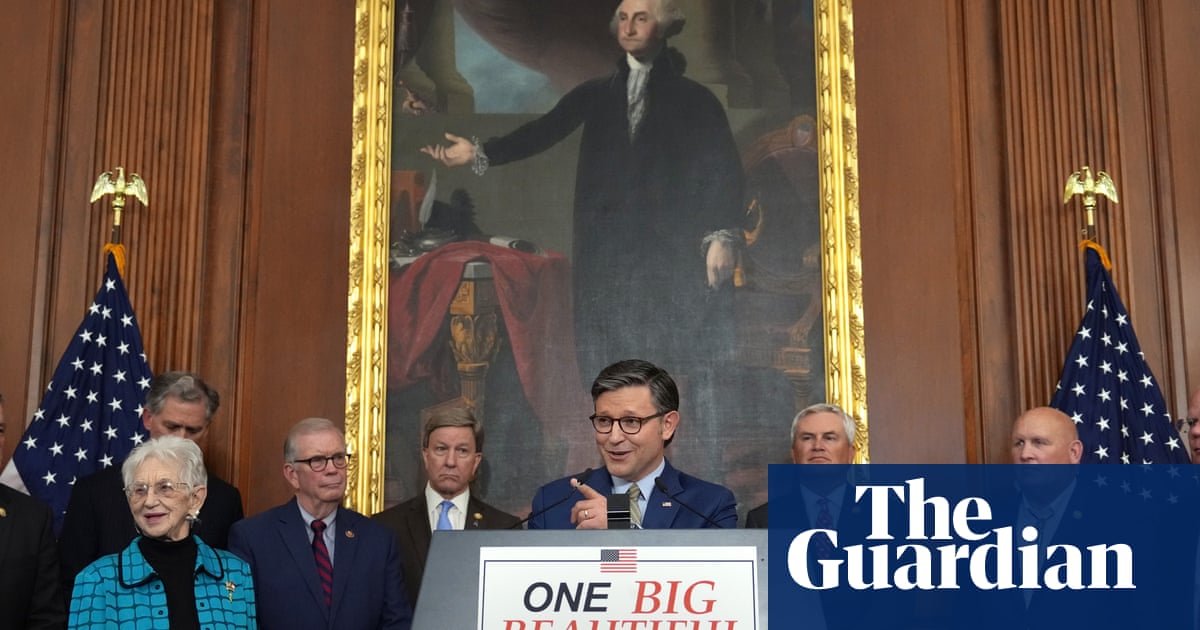Republicansin Congress are trying to pass a new tax and spending bill that may end up being a “big, beautiful bill” – but mostly for wealthy Americans.
With majorities in both theHouseandSenate, Republicans are working topassthe One Big Beautiful Bill Act that is set to make permanent huge tax cuts that were established in 2017.
Republicans say the new bill will “reduce spending and permanently lower taxes for families and job creators” and ultimately “make government work more efficiently and effectively for all Americans”, as the House speaker,Mike Johnson, said after the bill was passed.
But the biggest deductions will ultimately go to the wealthiest Americans, who stand to save hundreds of thousands of dollars a year in taxes if the 2017 tax cuts are made permanent.
For most Americans, the 2017 Tax Cuts and Jobs Act (TCJA) lowered taxes slightly after changes were made to the standard deduction rate and tax rates on most tax brackets were lowered. The bill also increased the child tax credit from $1,000 to $2,000 per child.
The bill was a major boon for wealthy Americans, who saw big savings after the tax cuts. The bill established a 20% deduction for income through certain business entities, known as pass-through entities, including LLCs and partnerships. It also doubled the estate and gift tax exemption from $5.5m to $11.2m per person, largely an aid to wealthy families.
Because the bill cut taxes for even the wealthiest Americans in the highest part of the top income bracket, this has meant that Americans in the top 0.1% percentile of earners are saving much more than lower- or even middle-class Americans.
Controversial cuts to the corporate tax rate, which dropped from 35% to 21% after the tax cuts were passed, will also be made permanent in the new bill.
A cut to the corporate tax rate has cost the federal government billions of dollars in lost revenue. From 2018 to 2021, the top corporations in the USsaveda combined $240bn in taxes after the cuts, according to an analysis from the Institute on Taxation and Economic Policy.
Trumpdefendedthe corporate tax cut in 2017, saying that it will be “fantastic for the middle-income people and for jobs”, implying that corporations will use their tax savings to invest in more workers and higher wages.
But some economists say the tax cuts did little to help the middle class. Wage growthslowedin 2019, two years after the cuts were passed, and only modestly grew because of inflation and high demand for workers immediately after the pandemic.
Meanwhile, companies spent more of their savings on stock buybacks – when a company buys shares of its own stock, a move that primarily benefits shareholders – than ever before.
Last year, Goldman Sachsestimatedthat stock buybacks will reach $1tn this year for the first time ever as share repurchases grow. Ananalysisfrom the progressive thinktank Groundwork Collaborative found that 11 top consumer goods corporations, including Procter & Gamble, PepsiCo and General Mills, spent a collective $463bn in stock buybacks since 2017.
As for the overall economy, economists say much of the growth in government revenue can beattributedto inflation and recovery from the pandemic recession that’s been seen in the US stock market – not the 2017 tax cuts.
“In general, the economy has not shown dramatic changes as a result of the tax cuts that were passed in 2017,” said Joseph Rosenberg, a senior fellow at the Tax Policy Center. “Most of the good quality evidence we have suggests that any effects on the economy were relatively modest.”
Estimatessay the tax cuts will cost the federal government $4.6tn in lost revenue over the next 10 years.
To offset the expense of tax cuts,Republicansare pairing the tax reductions with cuts to key government assistance programs, which Republicans say will save the federal government $1tn. Stricter work requirements for Medicaid and the Supplemental Nutrition Assistance Program (Snap) program will see fewer people accessing government healthcare coverage and food assistance.
The bill is also set to end clean energy tax credits that were passed under the Biden administration that encourage companies to utilize carbon-free energy sources and bolster clean energy technology production.
Trump has also said his tariffs will bring in “trillions of trillions of dollars to reduce our taxes and pay down our national debt”. Estimates say if all of Trump’s announced tariffs are set in place, including retaliatory tariffs that have beenpaused, they would only bring in an estimated $3.1tn over the next 10 years. The 10% universal tariffs would generate $2.17tn in revenue.
But tariffs are also a form of tax on the vast majority of American businesses that import goods from abroad. Over the last few months, companies including Walmart and the toymaker Mattel have said that they will ultimately have topass onsome of the cost of tariffs to consumers.
Analysis from the Yale Budget Labestimatesthat higher prices will cause an average American consumer to spend $2,800 more because of tariffs. Those at the bottom of the income distribution could lose $1,300.
Democrats have universally criticized the bill, with the Senate minority leader, Chuck Schumer, denouncing it as a “cruel and dangerous scheme” that will particularly harm working-class families who will also be affected by Trump’s tariffs.
“It’s really striking that this bill is both as fiscally irresponsible as it is and regressive,” said Daniel Hornung, Biden’s former deputy director of the National Economic Council and a senior fellow at MIT. “People making less than $50,000 a year will actually see their incomes go down, and it’s really to finance tax cuts for largely high-income people.”
